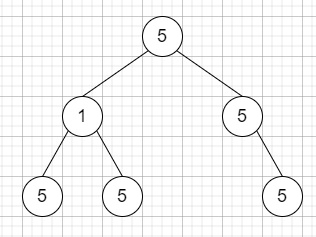
 Data Structure
Data Structure Networking
Networking RDBMS
RDBMS Operating System
Operating System Java
Java MS Excel
MS Excel iOS
iOS HTML
HTML CSS
CSS Android
Android Python
Python C Programming
C Programming C++
C++ C#
C# MongoDB
MongoDB MySQL
MySQL Javascript
Javascript PHP
PHP
- Selected Reading
- UPSC IAS Exams Notes
- Developer's Best Practices
- Questions and Answers
- Effective Resume Writing
- HR Interview Questions
- Computer Glossary
- Who is Who
Count Univalue Subtrees in C++
Suppose we have a binary tree; we have to count the number of uni-value subtrees. Here the Uni-value subtree indicates all nodes of the subtree have the same value.
So, if the input is like root = [5,1,5,5,5,null,5],

then the output will be 4
To solve this, we will follow these steps −
Define a function solve(), this will take node,
-
if node is empty, then −
return true
left := solve(left of node)
right := solve(right of node)
-
if left is false or right is false, then −
return false
-
if left of node is present and val of node is not equal to value of left of node, then −
return false
-
if right of node is present and val of node is not equal to value of right of node, then −
return false
(increase ret by 1)
return true
From the main method do the following −
ret := 0
solve(root)
return ret
Example
Let us see the following implementation to get a better understanding −
#include <bits/stdc++.h>
using namespace std;
class TreeNode{
public:
int val;
TreeNode *left, *right;
TreeNode(int data){
val = data;
left = NULL;
right = NULL;
}
};
void insert(TreeNode **root, int val){
queue<TreeNode*> q;
q.push(*root);
while(q.size()){
TreeNode *temp = q.front();
q.pop();
if(!temp->left){
if(val != NULL)
temp->left = new TreeNode(val);
else
temp->left = new TreeNode(0);
return;
}
else{
q.push(temp->left);
}
if(!temp->right){
if(val != NULL)
temp->right = new TreeNode(val);
else
temp->right = new TreeNode(0);
return;
}
else{
q.push(temp->right);
}
}
}
TreeNode *make_tree(vector<int< v){
TreeNode *root = new TreeNode(v[0]);
for(int i = 1; i<v.size(); i++){
insert(&root, v[i]);
}
return root;
}
class Solution {
public:
int ret;
bool solve(TreeNode* node){
if (!node || node->val == 0)
return true;
bool left = solve(node->left);
bool right = solve(node->right);
if (!left || !right)
return false;
if (node->left && node->left->val != 0 && node->val != node->left->val)
return false;
if (node->right && node->right->val != 0 && node->val != node->right->val)
return false;
ret++;
return true;
}
int countUnivalSubtrees(TreeNode* root){
ret = 0;
solve(root);
return ret;
}
};
main(){
Solution ob;
vector<int< v = {5,1,5,5,5,NULL,5};
TreeNode *root = make_tree(v);
cout << (ob.countUnivalSubtrees(root));
}
Input
{5,1,5,5,5,NULL,5}
Output
4

